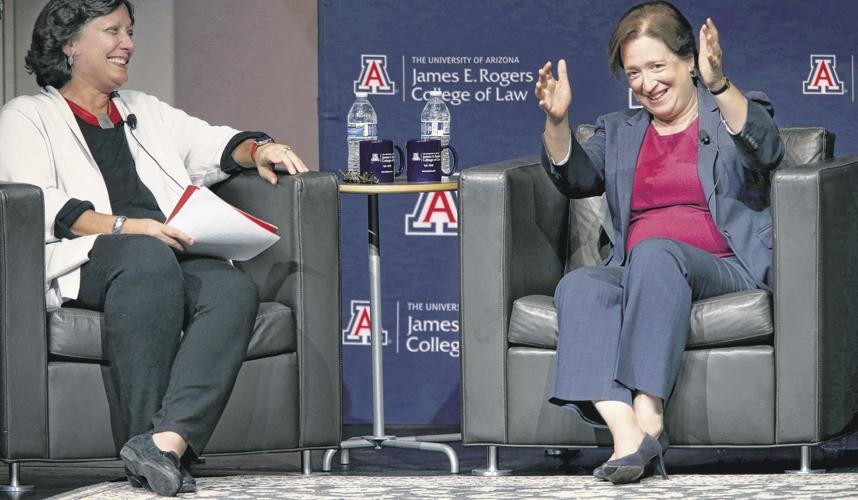U.S. Supreme Court Justice Elena Kagan told a UA audience Wednesday evening that the political pressure facing President Obama’s stalled high-court nominee doesn’t spill over onto sitting justices.
Justice Antonin Scalia died in February, leaving the court with eight justices, rather than nine. Obama nominated Merrick Garland to replace Scalia, but the Senate has not voted on the appointment.
In the context of Garland spending the longest period of time as a nominee without a confirmation vote, Kagan was asked whether justices ever feel political pressure.
The justices are subject to political pressures only during the nomination and confirmation process, Kagan told the packed house of University of Arizona law students, but the opinions of the president or members of Congress are “utterly irrelevant to us when we decide cases.”
Scalia was a “big voice” and the loss of his voice meant other justices adjusted their roles to “take over what he does,” she said.
Scalia’s “long-lasting legacy” will be his emphasis on the text of the law and legislative history. “He changed the way everybody does statutory interpretation,” she said, adding, on a personal note, “He was as generous, warm, and funny as a person could be.”
Many of her comments during the hourlong discussion with two deans of the UA’s James E. Rogers College of Law dealt with the intricacies of practicing law, but Kagan also remarked on the East Coast-centric nature of the nation’s highest court.
The court “is not right now a particularly diverse institution,” she said, highlighting a lack of “geographical diversity” and “law school diversity.”
“I think more than gender, race, or ethnicity it really does have to do with this kind of coastal perspective,” she said, noting many justices spent a large part of their lives in Washington, D.C., New York, and Boston.
“Those who haven’t, chances are that’s because they lived in California,” Kagan said to widespread laughter among the audience, one of dozens of moments of levity during the discussion.
An ideal court would represent various regions of the country, but the court’s makeup is not designed all at once, she said. Instead, presidents make appointments one at a time and must balance numerous considerations.
“It’s obviously true that people bring their backgrounds and experiences to the job in some sense,” Kagan said.
However, most demographic, geographic, and educational characteristics do not play an important role in each justice’s decision making, she said.
Instead, the lack of diversity affects how the public views the court, she said.
“People look at an institution and they see people who are like them, who share their experiences, who they imagine share their set of values, and that’s a sort of natural thing and they feel more comfortable if that occurs,” she said.






